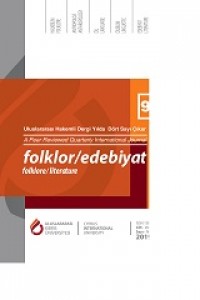A Comparative Study: Existentialism in No Exit by Jean Paul Sartre and Shadowless by Hasan Ali Toptaş
Öz
Existentialism has influenced a lot of literary works throughout history. Existentialism
can be studied in literary works by means of foregrounding the existential
themes and techniques. Some of these themes are being, change, freedom, selfcognizance,
isolation, responsibility, free-will, and alienation. Traversing the boundary
between philosophy and literature, this essay aims to analyse the existential
themes of Jean Paul Sartre’s No Exit or Huis Clos (1944) and Hasan Ali Toptaş’s
Shadowless1 or Gölgesizler (1993) with an intertextual and comparative approach.
This essay considers Sartre’s No Exit and Toptaş’s Shadowless as postmodern
texts. Before exploring the existentialist themes and techniques in No Exit and Shadowless,
this study aims to discuss the tradition of existentialism in literature. After
presenting an introductory review on such existentialist concepts in literature as
existence, essence, freedom, angst, and absurd, some recurrent themes in Sartre’s
and Toptaş’s works will be highlighted and analysed. After a brief exploration of
the influence of existentialism on Turkish literature, the essay will focus on the
textual analysis. No Exit will be analysed from the perspective provided by such
concepts as “being-for-itself”, “being-for-other”, “isolation and claustrophobic existence”; as for Shadowless, “being and nothingness” and “anxiety of uncertainty,
emptiness and meaninglessness” will serve as the existential themes reflected
in the novel. Within the framework of existentialism, an intertextual approach to
and a comparative analysis of Shadowless from Turkish Literature along with No
Exit from French Literature is an attempt of situating Modern Turkish Literature
within the broader regional and global context. As a last point, this paper also aims
to contribute both to critical studies on Sartre’s work and scholarship on the woks
of Hasan Ali Toptaş work whose works of fiction have rarely been discussed from
a comparative or world literature studies perspective.
Anahtar Kelimeler
Kaynakça
- Camus, A. (1991). The myth of Sisyphus and other essays. Trans. Justin O’Brien. New York: Vintage.
- Cox, G. (2009). Sartre and fiction. London: Continuum International.
- Kaufman, W. (1956). Existentialism from Dostoevsky to Sartre. New York: Meridian.
- Panza, C & Gale, G. (2008). Existentialism. Indiana: Wiley.
- Sartre, J. P. (1943) Being and nothingness. Cornwall: Routledge.
- Sartre, J. P. (1957). Existentialism and human emotions. New York: Citadel. Sartre, J. P. (1990). In camera (No exit or Behind closed doors). Trans. Stuart Gilbert, in In Camera and Other Plays. Harmondsworth: Penguin.
- Sartre, J. P. (2007). Existentialism is a humanism. New Haven: Yale University.
- Tanzer, M. (2008). On existentialism. Belmont: Thomson Wordsworth.
- Toptaş, H. A. (1995). Gölgesizler. İstanbul: İletişim.
- Toptaş, H. A. (2017). Shadowless. [Gölgesizler 1993]. Trans. Maureen Freely and John Angliss. London: Bloomsbury.
- Wartenberg, T. E. (2008). Existentialism: A beginner’s guide. Oxford: Oneworld.
Ayrıntılar
| Birincil Dil | İngilizce |
|---|---|
| Konular | Sanat ve Edebiyat |
| Bölüm | Derleme Makaleleri -Compilation Articles |
| Yazarlar | |
| Yayımlanma Tarihi | 1 Ağustos 2019 |
| Yayımlandığı Sayı | Yıl 2019 Cilt: 25 Sayı: 99 |
Derginin yayım dili Türkçe ve İngilizce’dir, ayrıca Türkçe de olsa tüm basılan makalelerin başlık, öz ve anahtar sözcükleri İngilizce olarak da makalede bulunur. Hakemlerden onay almış Türkçe makaleler için 750-1000 sözcükten oluşan genişletilmiş özet (extended summary) gereklidir. Elektronik çeviriler kabul edilmez.
Dergi TR-Dizin, Web of Science (ESCI), DOAJ ile diğer pek çok dizin tarafından taranmaktadır. Scimagoe quartile değeri: Q2 'dir:
TR DIZIN 2020 Etik Kriterleri kapsamında, dergimize 2020 yılından itibaren etik kurul izni gerektiren çalışmalar için makalenin yöntem bölümünde ilgili Etik Kurul Onayı ile ilgili bilgilere (kurul-tarih-sayı) yer verilmesi gerekecektir. Bu nedenle dergimize makale gönderecek olan yazarlarımızın ilgili kriteri göz önünde bulundurarak makalelerini düzenlemeleri önemle rica olunur.
Alan Editörleri/ Field Editörs
Halkbilimi/Folklore
Prof.Dr. Hande Birkalan-Gedik (JohannWolfgang-Goethe İniversitet-birkalan-gedik@m.uni-frankfurt.de)
Prof.Dr. Ali Yakıcı (Gazi Üniversitesi-yakici@gazi.edu.tr)
Prof.Dr. Aynur Koçak (Yıldız Teknik Üniversitesi-nurkocak@yildiz.edu.tr)
Prof.Dr. Işıl Altun (Regensburg Üniversitesi/Kocaeli Üniversitesi-İsil.Altun@zsk.uni-regensburg.de)
Doç.Dr. Ahmet Keskin (Samsun Üniversitesi-ahmet.keskin@samsun.edu.tr)
Edebiyat/Literature
Prof.Dr. Abdullah Uçman (Mimar Sinan Güzel Sanatlar Üniversitesi -emekli-29 MayısÜniversitesi-abdullahucman@29mayis.edu.tr
Prof. Dr. Ramazan Korkmaz (Ardahan Üniversitesi-emekli-Kafkasya Üniversiteler Birliği -KÜNİB-r_korkmaz@hotmail.com)
Prof.Dr. Emel Kefeli (Marmara Üniversitesi-emekli-İstanbul 29 Mayıs Üniversitesi-ayseemelkefeli @gmail.com)
Prof.Dr. Zekiye Antakyalıoğlu ( İstanbul Aydın Üniversitesi-zekabe@hotmail.com)
Antropoloji/Anthropology
Prof.Dr. Hanife Aliefendioğlu (Doğu Akdeniz Üniversitesi-hanife.aliefendioglu@emu.edu.tr)
Prof. Dr. Şebnem Pala Güzel (Başkent Üniversitesi-sebnempa@baskent.edu.tr)
Prof.Dr. Derya Atamtürk Duyar (İstanbul Üniversitesi-datamturk@istanbul.edu.tr)
Prof.Dr. Meryem Bulut (Ankara Üniversitesi-meryem.bulut@gmail.com)
Dil-Dilbilim/Language-Linguistics
Prof.Dr. Nurettin Demir (Hacettepe Üniversitesi-demir@hacettepe.edu.tr)
Prof. Dr. Aysu Erden (Maltepe Üniversitesi-aysuerden777@gmail.com)
Prof.Dr. Sema Aslan Demir (Hacettepe Üniversitesi-semaaslan@hacettepe.edu.tr)


